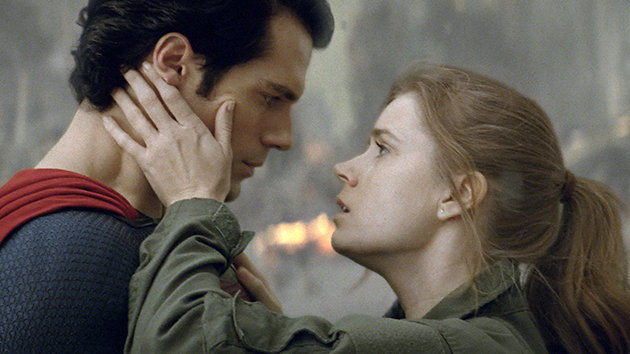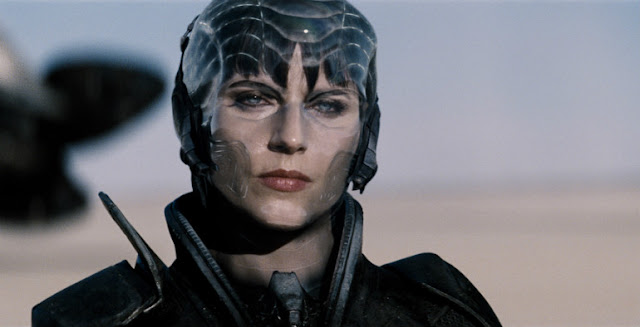 |
| Amy Adams as Lois Lane in Man of Steel |
In the Superman films with Margot Kidder and Christopher Reeve, Lois is a better reporter than Clark. He can type faster but she’s a shrewd investigative journalist. He has the brawn while she has the brains. But both share a morality: he wants to save people in danger; she wants to tell stories to inform the public and expose injustice. Because of this, both are fairly equal despite Superman’s superhero, god-like powers. There’s an interesting change in Lois’ role in Man of Steel. In the comics and previous films, Lois suspects but doesn’t know Clark is Superman, or if she does know, Clark erases her memory of his true identity. But here she discovers the truth early on. It puts the two characters on more equal ground.
 |
| Lois (Amy Adams) in Man of Steel |
What about Faora, Superman’s female Kryptonian, man-hating (in the comics) nemesis? She kicks some serious ass with a compelling fighting style. And it’s awesome. But again, she merely follows Zod, a dude, serving as his second in command. Why couldn’t she be in charge as the head villain? While she doesn’t have much personality, she does have an interesting exchange with Superman when she tells him he will always lose because he suffers the flaw of morality which she and her brethren have evolved past.
I initially thought this would be an annoyingly bro-tastic film with guidance and support strictly coming from the men in Clark/Kal-El’s life. But women play an equal role in the film. Unlike Star Trek Into Darkness where women remain mostly invisible or as sex objects, we see women in the military, women journalists besides Lois, and women on Krypton in leadership positions. “All of this may seem relatively minor, but it is rare for superhero movies to feature females in important, non-sexualized, non-damsel-in-distress roles.”
What is interesting though is Man of Steel’s commentary on masculinity. Throughout the film, Clark/Kal-El must wrangle with his emotions of identity and belonging. He wants to help people but his father keeps telling him he must hide his powers for people fear what they don’t understand, further underscoring the themes of immigration and xenophobia. When Clark is a young boy, he gets bullied. But he doesn’t fight back; he merely endures. He tells his father he wanted to hit the boy. His father nods and says that part of him wanted him to hit the bully. His father inquires, “But what would that accomplish?” When Clark is much older, traveling around and bouncing from job to job in anonymity, he again encounters a bully objectifying a female co-worker. He endures the bully’s taunts and walks away. There’s a continually dueling masculinity happening on-screen — a mature, calm and rational male who turns the other cheek and a toxic, aggressive, hyper-masculine male vying for supremacy.
 |
| Clark/Kal-El (Henry Cavill) and Martha Kent (Diane Lane) in Man of Steel |
Both sets of parents — Jor-El and Lara Lor-Van and Jonathan and Martha Kent — influence their son. Man of Steel shows how Clark/Kal-El benefits from the influence of both his adoptive and biological father and mother. Although it would have been nice to see Lara’s consciousness in the Fortress of Solitude, not just Jor-El. Through much of the film, it’s Jor-El and Jonathon Kent providing guidance. But Martha Kent provides as strong an impact on Clark. She teaches her son to silence all of the chaos in his mind (brought on by his superpower senses of hearing, sight and smell), to focus only on the sound of her voice. In a genre that often features “absent mothers,” it’s great to see the power of motherhood here.
By showcasing the strength of his bonds with his father and mother, the film asserts that men need both feminine and masculine spheres in their lives. Superman finds inner peace when he learns of his past and when Lois believes in him. The men in Clark/Kal-El’s life teach him outer strength while the women in his life teach him inner strength.
The message underscoring the film is choice. That we can choose our destiny, choose the lives we lead. I found this especially compelling considering 2013 is shaping up to be the worst year for reproductive rights and the film’s subtle reproductive justice theme as Jor-El and Lara defy the laws of Krypton to conceive Kal-El/Clark. They choose to defy the eugenics of their society and have a child who can choose his own path, not merely follow the one laid out for him by society. They also choose to jettison their child to Earth in order to save his life. While we get to see Jor-El in all kinds of action scenes, Lara is the one who chooses to push the button launching Kal-El when her husband is threatened. By the end of Man of Steel, Superman must make a choice. He must choose Krypton or Earth. And he ultimately decides through a surprising violent act that runs counter to Superman’s moral code. When he breaks down because of his decision, Lois is there to comfort him.
 |
| Lara Lor-Van (Ayelet Zurer) in Man of Steel |
While I liked it and it’s by far my favorite Snyder film (although trust and believe, that’s not saying much), it’s kind of a mess with tissue-thin characters and not being able to decide what it wanted to be. While it’s “criticial of hyper-masculinity and the violence it engenders” and “condemns sexual objectification and harassment of women,” the film’s last third contained such an onslaught of non-stop violent action it seems to contradict the theme of the perils of violence and aggression. Yet it’s nice to see a film argue that “choice saves the world.”
What does this mean? That men should choose to be gentle? That they should connect with femininity? That men should choose to use violence only when “necessary”? Perhaps it means that men don’t have to be aggressive bullies. They can choose another way as restraint, compassion and tenderness don’t strip men of their masculinity.
Some have hailed Man of Steel “the most feminist action film of the year.” Yes, it depicts women in various roles, boasts an intelligent female love interest and a kickass female villain, and questions toxic hyper-masculinity. Despite all its strides, can a film truly be feminist if it ultimately revolves around dudes?
 |
| Superman (Henry Cavill) and Lois (Amy Adams) in Man of Steel |


Lois Lane is one of the most misunderstood and vital female characters in fiction. She was created in 1938 as a career woman when the idea that women were allowed to be out in the workplace and not in the kitchen was a pretty, darn big deal. She’s been the victim of misogyny over the years, in part, the way ALL women are victims of misogyny when we try to exist as a strong woman in a man’s world.
I liked Lois Lane a ton in Man of Steel. It didn’t bother me in the slightest that Jor-El helped her on the ship. She’s a human being on an ALIEN ship. I don’t expect her to have knowledge about something so foreign.
What I love about Lois is that she ::is:: a normal, flawed woman. Her extraordinary abilities come from a will of steel and a tough spirit. She compliments Clark Kent because she is strong where he is weak. She’s also one of the few women in fiction defined first and foremost by being good at a job and not by her appearance.
It’s not that Lois has to be regulated to a “female” role. If anything, she’s often the opposite. Often, she’s the one pushing, the one being aggressive, the one pushing the “super” man to stand up and fight.
Lois and Clark is a unique superhero love story bc it’s about way more than what it appears. Superman loves Lois Lane, in part, because she’s fearless without privilege and good at her job. He’s the most powerful man in the world but she’s more powerful without privilege.
The movie stumbled bc it didn’t take enough time on Lois and Clark. Lois is the heart of the Superman mythos. The Superman mythos is about a man but it also revolves, in part, around a WOMAN. It’s a male driven narrative that has revolved around the SAME woman for 75 years. What they need to do in the sequel is remember this, keep it in the forefront and focus more on Lois specifically in the sequel.
I disagree about Lois’s role in the film, it read more like faux-action girl issues to me, but this gave me a lot of food for thought!
I’m late the party having just seen Supes this weekend but this is one of the few analysis’ of the film I’ve found that was worth reading and responding too.
SPOILER ALERT:
Great read, way too many reviews I’ve read haven’t touched on anything this deep about the femininity with in the film. The film was covered with vaginal and womb like imagery though out. Kal/El Clark goes through multiple births with in the film that are all focused on the mothers. In some ways if felt a very underscored comment on how integral the wives of male leaders have been in the last few hundred years. While Zod is the embodiment of the man saying I was made like this, society told me to act like this, and when I can’t get what I want I’ll fucking tear it all down. Which in turn i felt is why there was so much destruction in the film. Metropolis in this movie is taken apart and is now going through it’s own rebirth in a way. Zod is an old way of thinking (many of the men in Made Men, or the classic “she was asking for it” type of guy), hell when he was sent to the phantom zone the ships they were in were obviously cocks being blasted into an endless hole.
Sorry I’m rambling, happy to see the film ignite real thought and discussion about this and it’s nice to see not opinion but more analysis and deconstruction.
And why on Earth would Faora the commander over Zod? You’d have to change a good part of the story just to cram in another agenda. And at the end of the day who wants to see Superman snap a woman’s neck? My goodness…
This article perfectly illustrates why feminist should never ever be in creative positions.
A Hollywood movie summer of feminist creators would all consist of movies with the cast being 100% women spending the entire film killing,castrating and beating men. Also for future reference, stop talking about masculinity and hyper mascuinlinty because as a woman you will never know what it feels like to be a man.